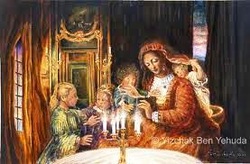Shalom Aleichem (liturgy) Song
Lyrics: Was written by the kabbalists of Safed in the late 16th or early 17th century inspired by Talmudic legend
Music by Rabbi Israel Goldfarb(1879-1956) Singers Kinderlach and Idan Yaniv(Israel)

Expression Shalom Aleichem according to Hebrew dictionary means "peace be upon you".
When Jews meet they say greeting to each other "Shalom Aleichem". The respond is "Aleichem Shalom”, what means upon you be peace. Many composers wrote different melodies for Shalom Aleichem. Some of them fast, some of them slow. On May, 1918 The Rabbi Israel Goldfarb composed a slow version for the Shalom Aleichem.
The words came from the Tikkune Shabbat, published in Prague in 1961. According to Jewish scholars Tikkune Shabbat was written in Safed by the followers of Kabbalh, also known as a Jewish mysticism. The legend said
that when people are returning from synagogue on Friday night 2 angles are following them – Good one and Evil one. If the house prepared for Shabbat – Lamp has been lit, the table set and his couch spread then good angel blessing the house and said that the next Shabbat will be the same. Evil angel forced to say “Amen”. If the home is not prepared for Shabbat then evil angel expressed that the next Shabbat will be the same and a good angel forced to say “Amen”. This song became universal. It’s a custom before to sing Shalom Aleichem on Friday night before Kiddush.
Rabbi Israel Goldfard said:
"The popularity of the melody traveled not only throughout this country but throughout the world, so that many people came to believe that the song was handed down from Mt. Sinai by Moses" (The Synagogue Journal February 10, 2006 Israel Goldfarb (1879-1967) Rabbi, Cantor and Influential Composer By Rabbi Henry D. Michelman)
When Jews meet they say greeting to each other "Shalom Aleichem". The respond is "Aleichem Shalom”, what means upon you be peace. Many composers wrote different melodies for Shalom Aleichem. Some of them fast, some of them slow. On May, 1918 The Rabbi Israel Goldfarb composed a slow version for the Shalom Aleichem.
The words came from the Tikkune Shabbat, published in Prague in 1961. According to Jewish scholars Tikkune Shabbat was written in Safed by the followers of Kabbalh, also known as a Jewish mysticism. The legend said
that when people are returning from synagogue on Friday night 2 angles are following them – Good one and Evil one. If the house prepared for Shabbat – Lamp has been lit, the table set and his couch spread then good angel blessing the house and said that the next Shabbat will be the same. Evil angel forced to say “Amen”. If the home is not prepared for Shabbat then evil angel expressed that the next Shabbat will be the same and a good angel forced to say “Amen”. This song became universal. It’s a custom before to sing Shalom Aleichem on Friday night before Kiddush.
Rabbi Israel Goldfard said:
"The popularity of the melody traveled not only throughout this country but throughout the world, so that many people came to believe that the song was handed down from Mt. Sinai by Moses" (The Synagogue Journal February 10, 2006 Israel Goldfarb (1879-1967) Rabbi, Cantor and Influential Composer By Rabbi Henry D. Michelman)
Yiddish
|
English
|
